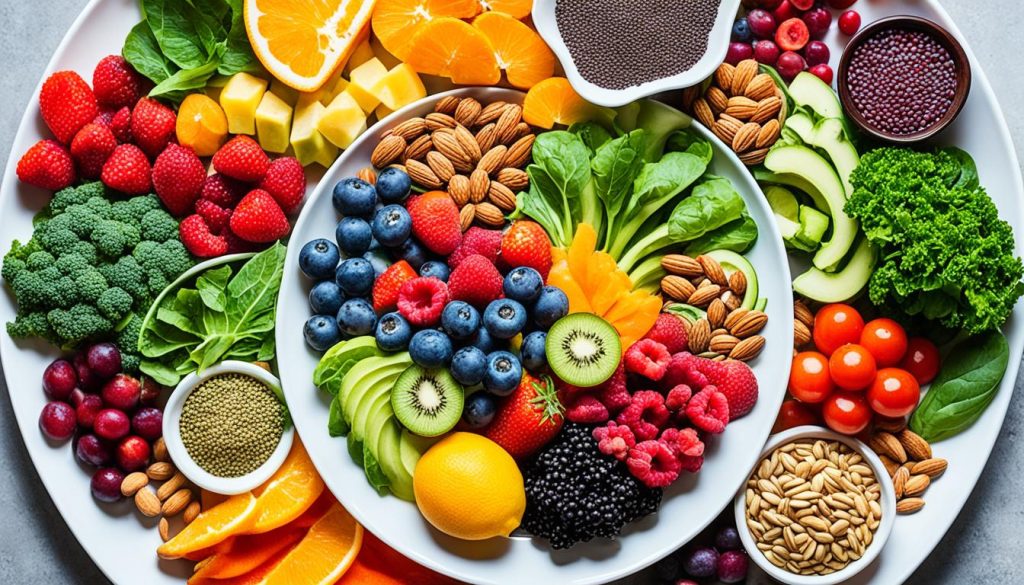Michelle’s journey to a better weight was full of ups and downs. She tried many diets that promised quick results. But in the end, she found they left her feeling disappointed and down. Eventually, she understood that real, lasting change needed a big shift in her life and how she thought about it.
Michelle discovered that effective weight loss plans don’t just fix what’s wrong for a little while. They focus on the whole picture, looking at both what you eat and how you live. By working towards eating fewer calories and moving more, she started to make real progress. She also picked up some healthy habits along the way, habits that made sure her changes stuck.
Michelle’s approach, which you might call mindful eating, showed her real results. She set goals she could really reach, watched how much she ate, and found fun in working out. This combination led her to success and helped her keep it up. Her story is a sign that with the right attitude and plan, anyone can find the way to lasting, effective weight loss and a life filled with health and joy.
Key Takeaways
- Effective weight loss requires permanent lifestyle and health habit changes.
- Creating a calorie deficit through a balanced diet and regular exercise is crucial.
- Setting realistic, achievable goals is key to maintaining long-term success.
- Developing healthy habits, such as mindful eating and stress management, supports sustainable weight loss.
- Seeking professional support can help overcome challenges and maximize results.
Prepare Yourself for a Successful Weight Loss Journey
Before starting your weight loss journey, check if you’re ready. Think about your
readiness
and why you want to lose weight. This self-evaluation is key to setting a strong start for your
healthy lifestyle changes
Assess Your Readiness
Look at your mindset, daily habits, and if you’re open to change.
Willingness to change
plays a big role. Ask yourself if you’re ready to tweak your diet and exercise routine. Also, spot things that might stop you like
distractions
or how you handle stress.
Coping mechanisms for stress
might slow you down. Create a plan to tackle them.
Identify Your Motivations
Think about why you want to lose weight.
Weight loss motivations
can keep you motivated. It could be to get healthier, wear a favorite outfit again, or boost your confidence. Your reasons should really matter to you.
Build a Support System
Having a support network is crucial. It could be friends, family, or professionals. They offer
accountability and encouragement
when things get tough. This support helps keep you focused and pushes you through tough spots.

Mental and emotional prep is critical for a successful weight loss path. By doing this, you set yourself for a healthy and lasting
weight loss journey
Set Realistic and Achievable Weight Loss Goals
Setting the right goals is key when starting to lose weight. Aim for losing 1-2 pounds each week. This means you should eat 500-1,000 fewer calories daily. This way, you can lose weight in a way that is good for your body for the long run.
Aim for a Healthy Rate of Weight Loss
It might be tempting to lose weight quickly, but it usually doesn’t last and can harm your health. Steady weight loss helps you change your lifestyle for good. This way, it gets easier to make healthy choices every day.
Establish Process Goals
Think about small habits you want to change in addition to losing weight. Like working out for 30 minutes a day or choosing healthy food for lunch. These goals can help you stay focused and feel like you’re making progress.
Celebrate Small Victories
Don’t overlook the small wins while you work on losing weight. Celebrate fitting into old jeans or losing a few pounds. Recognizing these moments can keep you going and make you feel good about your journey.

Losing weight is more like a marathon than a sprint. Keep your goals realistic and healthy habits strong. Don’t forget to cheer yourself on as you reach small and big milestones. Before you know it, you’ll see the progress you’ve worked hard for.
Embrace a Balanced and Nutritious Diet
Eating a balanced and nutritious diet is key for losing weight. It means eating lots of plant-based foods and limiting processed food. By doing this, you still get to enjoy tasty meals while cutting down on calories.
Increase Intake of Plant-Based Foods
Eating more fruits, veggies, and whole grains helps a lot when you’re trying to lose weight. These foods are full of fiber and low in calories. They make you feel full without eating too many calories. Aim to have them in most of your meals to boost your weight loss.
Choose Whole, Unprocessed Foods
Choosing whole foods for weight loss is important. Go for foods that are natural and not processed. They should be free of sugars and unhealthy fats. These foods keep you healthy and help you eat fewer calories without feeling hungry all the time.
Practice Portion Control
Keeping an eye on how much you eat is very important for losing weight. Try to keep your meals around 500 calories. This way, you can still enjoy your food. But you’re also helping your weight loss journey.

effective weight loss plans
Making a strong plan for losing weight involves looking at your whole life. It involves what you eat and how active you are. To start well, find a way to eat less but still healthy. This could be by eating foods that are not processed, and watching how much you eat.
It’s also vital to pick up healthy habits to help you lose weight. Try to eat slowly and pay attention to when you’re full. Pick up activities that boost your metabolism, like working out. And find ways to manage stress, which is good for burning calories.
The best weight loss plans are ones that help you change your life for good. Set real goals you can hit. Keep an eye on how well you’re doing. Stay motivated, even when it gets tough. Remember, real weight loss isn’t fast; it’s about making healthy choices every day for life.
| Key Strategies for Effective Weight Loss | Description |
|---|---|
| Calorie Deficit | Create a sustainable calorie deficit through a balanced diet and regular exercise to promote steady weight loss. |
| Balanced Diet | Focus on whole, unprocessed foods, such as fruits, vegetables, and lean proteins, to nourish your body while controlling portions. |
| Exercise Routine | Incorporate a variety of physical activities, including aerobic exercise and strength training, to boost metabolism and improve overall fitness. |
| Portion Control | Practice mindful eating and portion control to ensure you’re consuming the right amount of calories to support your weight loss goals. |
| Healthy Habits | Develop sustainable lifestyle changes, such as stress management techniques and mindful eating, to support your weight loss journey. |
Incorporate Regular Physical Activity
To lose weight effectively, it’s not just about eating right. You must also work out regularly. This makes your weight loss plan more powerful. It helps meet your goals, be it losing weight or getting healthier overall. Try to enjoy various physical activities. They really can change things for the better.
Engage in Aerobic Exercise
Aerobic exercises like walking, jogging, swimming, or biking are great for burning calories. They also make your heart stronger. Try to do 30 minutes of this kind of workout most days. These aerobic exercise for weight loss routines will help you use up more calories. Plus, they make your metabolism work better. This results in losing weight more easily and for the long term.
Strength Training for Muscle Tone
Adding strength training for weight loss is also a smart move. It includes lifting weights or doing bodyweight exercises. These workouts keep your muscles strong. As a result, your body burns more calories, even when you’re not active. Do strength training a few times a week. This will make your exercise mix complete and effective.
Find Activities You Enjoy
Enjoying your workout is key to sticking with it. Look for enjoyable physical activities for weight loss. This could be anything from dancing, hiking, or playing a sport, to joining a new exercise class. Pick something that interests you. Doing what you love keeps you motivated. It makes your weight loss journey both fun and successful.

Develop Healthy Habits and Lifestyle Changes
For long-term success in weight loss, it’s key to change habits and lifestyle. Look closely at how you eat and handle stress. These are crucial.
Mindful Eating
Being mindful of what and how you eat can better your relationship with food. It supports your goal of losing weight. Pay real attention to when and what makes you full during meals. Enjoy your food thoughtfully. By doing this, you’ll stop eating when you’re not really hungry and make wiser food choices.
Stress Management Techniques
Keeping stress under control helps keep you on track with your weight loss journey. Stress can lead to eating because of your emotions. Find healthy ways to deal with stress. This can be through meditation, deep breathing, or fun exercises. By handling stress well, you won’t need to eat just to feel better. It’s about getting to the root of your feelings about food.

Remember, making healthy changes is a commitment not just for a bit but for life. Focus on how you eat and reducing stress. These strategies help you lose weight and keep it off for good.
Overcome Challenges and Setbacks
On your weight loss journey, bumps and hiccups are common. It’s key not to give up completely. Identify weight loss obstacles early and figure out coping strategies for weight loss challenges. Learn to bounce back from weight loss setbacks to keep moving forward.
Identify Potential Obstacles
Think about what might slow you down, like not enough time, eating when stressed, or struggling to stay active. Knowing these hurdles lets you tackle them head-on before they mess up your progress.
Develop Coping Strategies
After spotting your challenges, start creating ways to deal. This could mean planning meals ahead to avoid bad food, trying new ways to chill out, or getting loved ones involved to support you.
Bounce Back from Setbacks
You’ll likely face some speed bumps, maybe slipping on your eating or missing a workout. Instead of getting down on yourself, stay open to changes and forgiveness. Setting big, clear goals helps people succeed in losing weight, failure and all.
Keep in mind, losing weight is a long haul, not a quick fix. Expecting and getting ready for tough times, having strong strategies to cope, and getting back up after falls, will help you reach and stay at your goal.

Seek Professional Support When Needed
If losing weight feels tough, even with healthy changes, consider expert help. Weight loss medication might be a good step, especially if you need to lose a lot. Or if you’re finding it really hard.
Talk to a healthcare professional about using weight loss meds. They’ll check your health and history. Then they can suggest the best plan for you.
Also, look into weight loss counseling and other support options. Maybe working with a dietitian or joining a weight loss support group. They can offer great advice and help keep you on track.
With the right professional support for weight loss, you’ll have what you need to succeed. And keep that success going.
Celebrate Your Progress and Maintain Your Success
Reaching your weight loss goals is a big achievement. It’s vital to take time to celebrate. Use various ways like a nutrition app, journaling, or photos to track your progress. This can keep you motivated by showing the positive changes you’ve made.
Track Your Achievements
It’s key to keep an eye on your progress. Tracking your weight, body measurements, and more provides valuable insights. It keeps you accountable and motivated. It shows the real changes you’re making through your efforts.
Develop a Maintenance Plan
After you’ve hit your goal weight, focus on staying there. Make a maintenance plan that includes healthy eating and regular exercise. This plan will help you keep your achievements. It also prepares you for further progress if you ever need it.
Staying at your goal weight is a journey. Celebrate your wins and keep up your healthy habits to stay successful. This way, you’ll reach and maintain your weight loss goals.
![]()
Conclusion
Effective weight loss plans don’t just focus on diet or lifestyle changes. They combine both. One must get ready for the weight loss journey. Set real and attainable goals. Eat a balanced, nutritious diet. Be active regularly. Form good habits. Face problems head-on. And, look for help when necessary.
By focusing on a holistic approach to losing weight, you can make it. And keep the weight off over time. It’s not just about hitting a weight goal. It’s about making life changes that make you healthier. This includes being mindful about what you eat, controlling your portions, and finding ways to boost your metabolism.
Love the journey, cheer each step forward, and keep on with your weight loss plans. With the right mindset and actions, you can eat well, be healthy, and make lasting changes in your life. These steps will take you where you want to be and keep you there.




